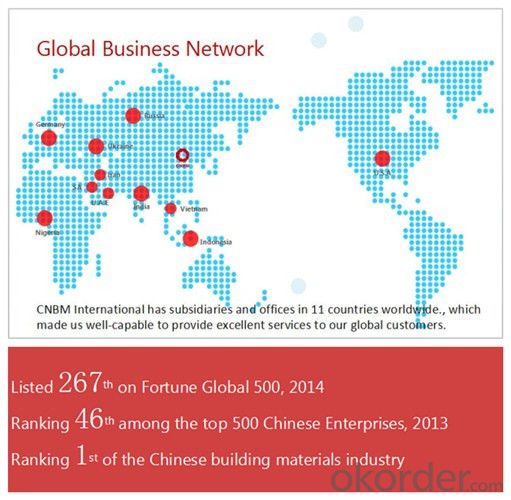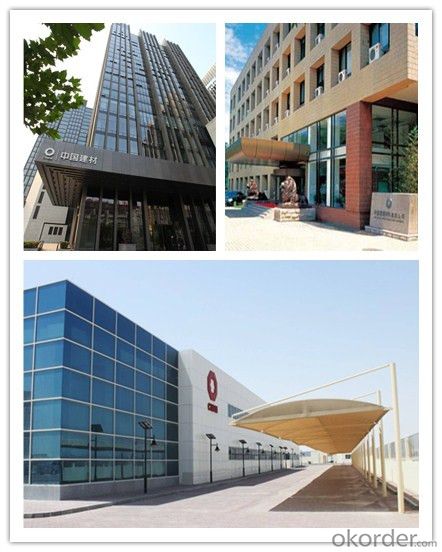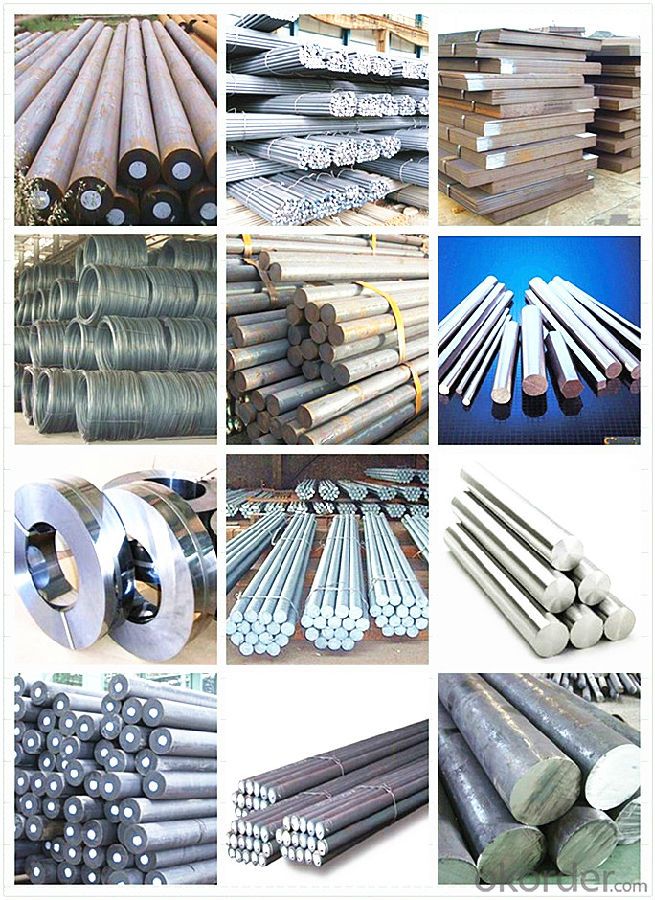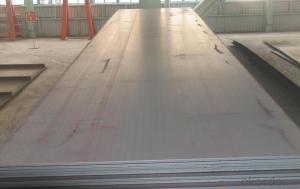ASTM A516 Grade 70 Pressure Vessel Steel Plate
- Loading Port:
- Tianjin
- Payment Terms:
- TT OR LC
- Min Order Qty:
- 3 m.t.
- Supply Capability:
- 100000 m.t./month
OKorder Service Pledge
OKorder Financial Service
You Might Also Like
Item specifice
ASTM A516 Grade 70 Pressure Vessel Steel Plate
Detailed Information of ASTM A516 Grade 70 Pressure Vessel Steel Plate
| C | Si | P | S | yield Strength MAp | Tensile strength MAp | Elongation % | ||
| A36 | 0.24 | 0.4 | 0.045 | 0.03 | 250 | 400-520 | 26 | |
| C | Si | Mn | P | S | Cu | |||
| A283 | ≤0.27 | 0.15-0.4 | ≤0.9 | ≤0.035 | ≤0.04 | ≥0.2 | ||
| Thickness: | 6mm, 8mm, 12mm, 16mm, 20mm, 25mm, 30mm, 50mm, 80mm, 100mm, 150mm, 200mm | |||||||
| Width: | 1500mm, 1800mm, 2000mm, 2200mm, 2500mm | |||||||
| Length: | 6000mm, 8000m, can cut to width and length | |||||||
| Packing Details; | according to customer‘s require or export’s standard | |||||||
| Delivery time; | 7 days for stock sizes, 20-25 days for new production sizes | |||||||
| Port: | Tianjin China | |||||||
Related Products Overviews of ASTM A516 Grade 70 Pressure Vessel Steel Plate
Product Name | Typical Grades | Diameter(mm) | Standard Adopted |
Carbon Steel | 20 (1020/S20C/C22) |
Ø16-Ø300 |
GB/SAE/ JIS/DIN |
40 (1040/S40C/C40) | |||
45 (1045/S45C/C45) | |||
Bearing Steel | GCr9 (51100/SUJ1) |
Ø12-Ø250 | |
GCr15 (52100/SUJ2/100Gr6) | |||
GCr9SiMn (A485-Gr.1/SUJ3) | |||
Cr-Mo Steel | 20Cr (5120/SCr420H/20Cr4) |
Ø12-Ø250 | |
40Cr (5140/SCr440/41Cr4) | |||
42CrMo(4140/SCM440/42CrMo4) | |||
Gear Steel | 20CrNiMo |
Ø16-Ø600 | |
20CrMn(5115/SMnC420/20MnCr5) | |||
20CrNiMo(8620/SNCM220/20CrMiMo2) |
Related Products Application of ASTM A516 Grade 70 Pressure Vessel Steel Plate
Carbon Steel | l Mold bottom l Plastic mold l Construction machinery parts l Automobile parts l Security grills l Screens l Construction |
Bearing Steel | l Aerospace l Navigation l Nuclear energy l Chemical industry l Electronic information l Petrochemical l Instrument and meter l Transportation |
Cr-Mo Steel | l Mechanism & Fasteners gear l Stressed components for vehicles l Engines and machines l Parts of larger cross-section |
Gear Steel | l All kinds of gears l Statically and dynamically stressed component for vehicles l Engines and machine l Larger cross-section parts l Crankshafts |
Company Introduction of ASTM A516 Grade 70 Pressure Vessel Steel Plate
CNBM International Corporation is the most import and export platform of CNBM group(China National Building Material Group Corporation) ,which is a state-owned enterprise, ranked in 270th of Fortune Global 500 in 2015.
With its advantages, CNBM International are mainly concentrate on Cement, Glass, Iron and Steel, Ceramics industries and devotes herself for supplying high quality series of refractories as well as technical consultancies and logistics solution.


After-sale service | l CNBM provides the services and support you need for every step of our cooperation. We’re the business partners you can trust; you can relax and get on with doing business. l For any problem, please kindly contact us at any your convenient time, we’ll reply you in our first priority within 24 hours
|
Advantages
| l Industry experience over 20 years. l Shipment of goods -More than 70 countries worldwide. l The most convenient transport and prompt delivery. l Competitive price with best service. l High technical production line with top quality products. l High reputation based on best quality products.
|
Packaging & Delivery of ASTM A516 Grade 70 Pressure Vessel Steel Plate
Packaging Detail | Sea worthy packing /as per customer's packing instruction |
Delivery Detail | 15 ~ 40 days after receiving the deposit |
Products Show

FAQ:
Are you a trading company or manufacturer? | Manufacturer |
What’s the MOQ? | 3 metric ton |
What’s your delivery time? | 15-35 days after downpayment received |
Do you Accept OEM service? | Yes |
what’s your delivery terms? | FOB/CFR/CIF |
What's the Payment Terms? | 30% as deposit,70% before shipment by T/T |
Western Union acceptable for small amount. | |
L/C acceptable for large amount. | |
Scrow ,Paybal,Alipay are also ok | |
Why choose us? | Chose happens because of quality, then price, We can give you both. Additionally, we can also offer professional products inquiry, products knowledge train (for agents), smooth goods delivery, excellent customer solution proposals. |
What's your available port of Shipment? | Main Port, China |
What’s your featured services? | Our service formula: good quality+ good price+ good service=customer's trust
|
Where are your Market? | Covering more than 160 countries in the world |
- Q:What are the specific requirements for special steel used in the nuclear fuel industry?
- The specific requirements for special steel used in the nuclear fuel industry include high resistance to corrosion and radiation, exceptional strength and toughness, low thermal expansion, and the ability to withstand high temperatures. Additionally, the steel must meet stringent quality control standards, have excellent weldability, and maintain its integrity over extended periods of time to ensure the safety and efficiency of nuclear fuel operations.
- Q:What are the limitations of using special steel in marine environments?
- Special steel can be susceptible to corrosion and pitting when exposed to saltwater in marine environments. Additionally, the high cost and difficulty in sourcing and maintaining special steel can also be limiting factors.
- Q:What are the requirements for special steel used in high-pressure applications?
- To ensure its durability and reliability under extreme conditions, special steel utilized in high-pressure applications must fulfill specific criteria. Some of the crucial requirements for this type of steel include the following: 1. Exceptional strength: The steel must possess extraordinary strength to withstand the intense forces and pressures it will encounter. This allows it to resist deformation and maintain its structural integrity. 2. Remarkable corrosion resistance: The steel needs to exhibit a high resistance to corrosion since it will frequently come into contact with aggressive fluids or gases in high-pressure environments. This prevents deterioration over time and helps sustain its performance and longevity. 3. Good weldability: The special steel employed in high-pressure applications should have good weldability in order to facilitate easy and efficient joining of different components. This ensures the overall integrity and reliability of the system. 4. Endurance against high temperatures: The steel must be capable of withstanding elevated temperatures without compromising its mechanical properties. This is particularly critical in applications where high-pressure fluids or gases are heated or where the steel is exposed to extreme heat sources. 5. Resistance to fatigue: The special steel should display a high resistance to fatigue failure, as it will often undergo cyclic loading and pressure fluctuations. This enables the steel to endure repeated stress and pressure cycles without developing cracks or failures. 6. Precise dimensional tolerance: The steel should possess precise dimensional tolerance to ensure proper fit and functionality within the high-pressure system. This helps minimize leakage or any potential weak points in the system. 7. Compliance with industry standards: The special steel used in high-pressure applications must meet relevant industry standards and specifications, such as those established by organizations like the American Society of Mechanical Engineers (ASME) or the American Petroleum Institute (API). This guarantees that the steel meets the required quality and performance standards. In summary, special steel for high-pressure applications must possess a combination of extraordinary strength, remarkable corrosion resistance, good weldability, endurance against high temperatures, resistance to fatigue, precise dimensional tolerance, and compliance with industry standards to ensure its suitability and reliability in demanding environments.
- Q:How does special steel perform under extreme cold conditions?
- Special steel is specifically designed to perform well under extreme cold conditions. It has excellent resistance to low temperatures and retains its strength and toughness even in freezing temperatures. This is achieved through the addition of alloying elements such as nickel, chromium, and molybdenum, which enhance the steel's ability to remain ductile and resist brittle fracture. In extreme cold temperatures, regular steel tends to become brittle and may fracture easily. However, special steel exhibits remarkable toughness and resilience. It can withstand the extremely low temperatures without losing its mechanical properties, making it suitable for various applications in cold environments. Moreover, special steel also offers excellent corrosion resistance, which is crucial when exposed to extreme cold conditions. Corrosion can be accelerated in cold environments due to factors like moisture, salt, and freezing and thawing cycles. However, the corrosion-resistant properties of special steel prevent it from deteriorating and maintain its structural integrity. Additionally, special steel has superb thermal conductivity, allowing it to efficiently transfer heat even in extremely low temperatures. This characteristic is essential in applications where heat transfer is critical, such as in cryogenic systems or cold storage facilities. Overall, special steel's exceptional performance under extreme cold conditions makes it an ideal material for various industries and applications, including aerospace, oil and gas, automotive, and construction. Its ability to maintain strength, toughness, corrosion resistance, and thermal conductivity at low temperatures ensures reliable and safe operation in severe cold environments.
- Q:How does special steel perform in high-vibration applications?
- Special steel performs exceptionally well in high-vibration applications due to its superior strength, durability, and resistance to fatigue. These properties enable it to withstand intense vibrations without compromising its structural integrity, resulting in enhanced performance and extended service life in such demanding conditions.
- Q:What are the safety benefits of using special steel?
- Using special steel can provide several safety benefits in various applications. One of the main advantages is its enhanced strength and durability compared to traditional steel. Special steel is often designed to withstand extreme conditions, such as high temperatures or corrosive environments, making it ideal for applications in industries like aerospace, automotive, and oil and gas. The high strength of special steel allows for the construction of safer and more reliable structures. It can withstand heavy loads, reducing the risk of structural failures or collapses. This is crucial in industries where the safety of workers, equipment, and the general public is of utmost importance. Another safety benefit of special steel is its resistance to corrosion. Corrosion can weaken structures and compromise their safety. Special steel is often alloyed with elements like chromium, nickel, or molybdenum, which provide excellent corrosion resistance. This makes it suitable for applications in marine environments, chemical processing plants, or any setting where exposure to moisture or chemicals is a concern. Special steel is also known for its ability to retain its mechanical properties at high temperatures. This makes it an excellent choice for applications where heat resistance is crucial, such as in the construction of fire-resistant structures or in the manufacturing of industrial ovens and furnaces. By using special steel in these applications, the risk of structural failure or fire-related accidents can be significantly reduced. Furthermore, special steel can offer improved fatigue resistance, which is important in applications subject to cyclic loading or vibration. Fatigue failure can occur when a material experiences repeated stress over time, leading to cracks and eventual failure. Special steel can be engineered to have excellent fatigue properties, reducing the likelihood of unexpected failures and improving the overall safety of structures or equipment. In summary, the safety benefits of using special steel include enhanced strength, durability, corrosion resistance, heat resistance, and fatigue resistance. These properties make special steel a reliable choice for industries where safety is a top priority, ensuring the protection of workers, equipment, and the general public.
- Q:Can special steel be used in the paper manufacturing industry?
- Yes, special steel can be used in the paper manufacturing industry. It is commonly used for the construction of machinery and equipment such as rollers, blades, and cutting tools, due to its high strength, durability, and resistance to wear and corrosion. Special steel can also be used for the production of paper mill rolls, which are essential for the processing and production of paper.
- Q:What are the different production methods for special steel?
- There are several production methods for special steel, including electric arc furnace (EAF), basic oxygen furnace (BOF), and vacuum arc remelting (VAR). Each method has its own advantages and is used depending on the specific requirements of the steel being produced. EAF is commonly used for recycling scrap steel and allows for flexibility in alloy composition. BOF is more suitable for large-scale production and is known for its efficiency in removing impurities. VAR is a specialized method used to refine and purify steel, resulting in high-quality, homogeneous products.
- Q:Can special steel be used in the nuclear power industry?
- Yes, special steel can be used in the nuclear power industry. Special steel is often used for components such as reactor pressure vessels, steam generators, and fuel cladding in nuclear power plants. Special steel's high strength, resistance to corrosion, and ability to withstand high temperatures make it suitable for the demanding conditions and safety requirements of the nuclear power industry.
- Q:Can special steel be used in the chemical industry?
- Yes, special steel can be used in the chemical industry. Special steel is often chosen for its resistance to corrosion, high temperature stability, and strength, making it suitable for various applications in the chemical industry such as storage tanks, pipelines, and equipment used in the manufacturing of chemicals.
1. Manufacturer Overview |
|
|---|---|
| Location | |
| Year Established | |
| Annual Output Value | |
| Main Markets | |
| Company Certifications | |
2. Manufacturer Certificates |
|
|---|---|
| a) Certification Name | |
| Range | |
| Reference | |
| Validity Period | |
3. Manufacturer Capability |
|
|---|---|
| a)Trade Capacity | |
| Nearest Port | |
| Export Percentage | |
| No.of Employees in Trade Department | |
| Language Spoken: | |
| b)Factory Information | |
| Factory Size: | |
| No. of Production Lines | |
| Contract Manufacturing | |
| Product Price Range | |
Send your message to us
ASTM A516 Grade 70 Pressure Vessel Steel Plate
- Loading Port:
- Tianjin
- Payment Terms:
- TT OR LC
- Min Order Qty:
- 3 m.t.
- Supply Capability:
- 100000 m.t./month
OKorder Service Pledge
OKorder Financial Service
Similar products
New products
Hot products
Related keywords

































